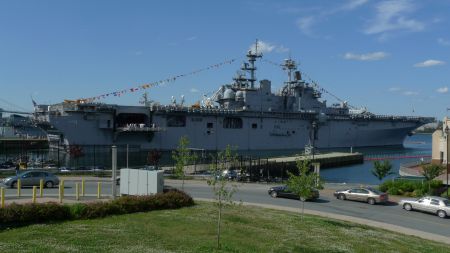The small, yet passionate congregation of picketers stands in front of the HMCS dockyard, home to 5,000 Canadian and international sailors until July 2nd.
The Navy is celebrating its 100th birthday, an occasion that’s being marked by “Fleet Review Week,” bringing dozens of military vessels into Halifax Harbour. Not everyone, however, is joining in the soirée.
“There are a bunch of warships in the harbour and people think it’s time to throw a giant party,” says Tarmara Lorincz, standing in front of a banner reading “No harbour for war.”
“I don’t support a culture of war,” Lorincz says. “What if we were redirecting military funding...into our environment, into healthcare, into education?”
Lorincz also points to who’s helping pay for the festivities. Lockheed Martin, an international weapon’s manufacturer that recently won a $2 billion dollar contract to modernize the Canadian Navy, is partnering with other defense contractors and the government to pay for Fleet Week.
“This is a company that can’t be trusted.” She says, pointing to the company’s record of going over budget and running into production issues. “Lockheed Martin is a cancer – it needs to get right out of the province.”
Lorincz is concerned about the lack of communication about the ships and any safety hazards they may pose, “We are concerned that these ships are nuclear armed, nuclear powered or loaded with missiles tipped with depleted uranium – we haven’t been told.”
It’s a worry Lorincz voiced to the Head of Marine Command, Vice Admiral Dean McFadden. While at a conference where he was speaking, she asked McFadden if there would be any nuclear material on the ships. He didn’t answer the question.
Lorincz, the 41-year old executive director of the Nova Scotia Environmental Network has no issues voicing this concern to sailors and civilians alike.
“If you don’t like freedom, you can live in Afghanistan or Iraq,” says one biker, his motorcycle rumbling as he pulls over to heckle the protesters. With the tenacity of a mother bear, Lorincz catches him off guard, saying “We need more nurses, we don’t need more soldiers.”
Not all who pass by, however, are hostile to the group. A couple of drivers flash a thumbs up or honk their horns. Two Danish sailors, returning from a mission to protect aid ships on their way to Africa, stop to offer high fives.
Lorincz, however, is cautious of letting any facet of the military – even supposed aid ships – off the hook, “The military is not trained to deliver aid, most of its resources are going to war,” she says.
For Lorincz, the Fleet Review just isn’t worth the $1 million price tag, “The review historically was to inspect the navy before it went to war...but who’s the enemy?”



